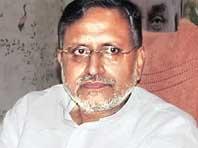 | « Back to article | Print this article |
 Sushil Kumar Modi, deputy chief minister and finance minister of Bihar, chairs the Empowered Committee of State Finance Ministers negotiating the proposed goods and services tax.
Sushil Kumar Modi, deputy chief minister and finance minister of Bihar, chairs the Empowered Committee of State Finance Ministers negotiating the proposed goods and services tax.
He tells Business Standard the spirit of collective federalism needs to be heeded by all sides if the key reform is to become a reality.
Edited excerpts:
The Centre and states differ on a number of issues on the GST. What is the status?
The states favour GST introduction and have been making all possible efforts so that it is implemented as early as possible.
When such a major tax reform exercise is taken up, neither the state nor the Centre can be singled out for delays.
Studies show the time taken in other countries, in particular the federal countries, in implementation of such major reforms has been much more.
In a federal country like ours, differences of opinions between the Centre and the states, and among the states, can always be there.
Such differences should not be construed as signs of non-cooperation.
The states have expressed concerns over fiscal autonomy, revenue loss, extent of compensation and encroachment on their territory.
They've also objected to establishment of the (proposed) GST dispute settlement authority; they feel a GST Council headed by the (Union) finance minister can be vested with dispute settlement powers.
We have crossed a major hurdle, as Parliament's standing committee on finance would start deliberations on the Constitution Amendment Bill (on this issue) from June 8.
It is expected to prepare its report before the monsoon session.
The report would then be discussed by the central cabinet, to be followed by discussions with political parties.
For the proposed constitutional amendment, a two-thirds approval is required (in Parliament, in both Houses) and among the state assemblies, too.
If a GST is being implemented in 130 countries, why not in India? I am convinced the GST will be introduced, provided the concerns raised by states are addressed properly.
Is there a deadline you are looking at?
Already 2011-12 and 2012-13 have been passed. I think we are inching towards the GST, though not very fast.
Why are states apprehensive about revenue loss?
Similar concerns were voiced by states at the time of introduction of the value added tax, but the subsequent experience has dispelled such fears.
There has been marked improvement in the growth of revenue earned by states.
Some states believe they stand to gain a little through the taxation of services.
At present, not more than 15 per cent of the total services sector is being taxed and even if a substantial part of the currently untaxed portion were to fall in the negative list, that still leaves considerable potential for tax yield from the service sector.
Manufacturing states like Maharashtra, Gujarat, Tamil Nadu and Andhra Pradesh see a major loss, while consuming states like Bihar are not going to incur any major loss.
These concerns need to be addressed.
Besides, states have made a case that compensation by the government of India for a short period, say five years, is necessary.
The states also feel an independent mechanism is needed so that in case they suffer losses, they are compensated without any difficulty.
This apprehension of the states is mainly because the experience of getting Central Sales Tax loss compensation from the Centre has not been very happy.
Image: Sushil Kumar Modi | Photograph courtesy: Business Standard